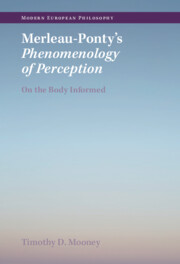Book contents
- Merleau-Ponty’s Phenomenology of Perception
- Modern European Philosophy
- Merleau-Ponty’s Phenomenology of Perception
- Copyright page
- Contents
- Acknowledgements
- Abbreviations
- Preface
- Chapter 1 Phenomenology and Objective Thought
- Chapter 2 Sensations, Associations and Explanations
- Chapter 3 Attention, Judgement and Other Work
- Chapter 4 Back to the Experience of the Body
- Chapter 5 The Body Schema and Our Skills
- Chapter 6 Motor Intentionality and Our Landscapes
- Chapter 7 Others Expressive, Engaged and Exposed
- Chapter 8 Language, Speech and Affectivity
- Chapter 9 Temporality, Subjectivity and Idealisation
- Bibliography
- Index
Chapter 8 - Language, Speech and Affectivity
Published online by Cambridge University Press: 03 November 2022
- Merleau-Ponty’s Phenomenology of Perception
- Modern European Philosophy
- Merleau-Ponty’s Phenomenology of Perception
- Copyright page
- Contents
- Acknowledgements
- Abbreviations
- Preface
- Chapter 1 Phenomenology and Objective Thought
- Chapter 2 Sensations, Associations and Explanations
- Chapter 3 Attention, Judgement and Other Work
- Chapter 4 Back to the Experience of the Body
- Chapter 5 The Body Schema and Our Skills
- Chapter 6 Motor Intentionality and Our Landscapes
- Chapter 7 Others Expressive, Engaged and Exposed
- Chapter 8 Language, Speech and Affectivity
- Chapter 9 Temporality, Subjectivity and Idealisation
- Bibliography
- Index
Summary
In this chapter I traverse Merleau-Ponty’s account of language as the medium of thought, in which conceptual significations inhabit words instead of lying behind them (a mistake common to empiricist and intellectualist theories). We do not inspect an indicating word and indicated thing to reach a verbal signification. Rather we learn it as we learn to use a tool, by seeing it employed in a certain situation. Through the words that we utter we act and project action possibilities ahead of ourselves, as well as our attitudes towards these possibilities. Language is manifested as creative or speaking speech and as habitual or spoken speech. This explication is followed by an outline of Merleau-Ponty’s view of our affective lives in knowing, acting and loving, in which we always encounter others and things within a certain mood or mode of attunement, one that can widen or narrow down the world of possibilities.
- Type
- Chapter
- Information
- Merleau-Ponty's Phenomenology of PerceptionOn the Body Informed, pp. 186 - 205Publisher: Cambridge University PressPrint publication year: 2022

